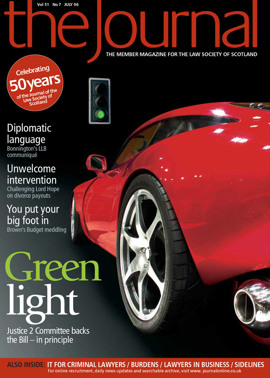A summary matter

Amendment to Ordinary Cause Rules
With effect from 4 May 2006 the ordinary cause rules have been amended. The effect of the amendments take account of the Gender Recognition Act 2004, the Civil Partnership Act 2004, and the Family Law (Scotland) Act 2006. For example, actions for declarator of marriage and nullity of marriage fall with the definition of “family actions”. In respect of civil partnerships, there is a new chapter 33A. These rules, in effect, reflect the rules applicable to “family actions”.
Assisting a party litigant
In Kenneil v Kenneil, 16 June 2006 Lord Glennie considered that a party litigant had a fundamental right to represent him/herself for whatever reason. However, he indicated that in certain circumstances, such a litigant could be represented by someone other than a solicitor or advocate. In England, the courts have recognised that a party litigant could feel at a disadvantage in presenting his case. In such circumstances a court could permit him to be assisted by another. Whether this was permitted was a matter for a court’s discretion. In this case the person who was to represent the party had acted as one with the party; they were spouses. The subject matter of the dispute could be considered to have been the property of the proposed representative. No further problems would be caused. The representative was as familiar with the litigation as the party himself. The representative held a power of attorney to act on behalf of the party in matters generally. Time was an issue.
Options and procedural hearings
Further observations were made on options and procedural hearings in a recent decision from Sheriff Principal Lockhart, McGill v McGill, Hamilton Sheriff Court, 7 June 2006. This was an appeal from the allowance of a proof before answer at a procedural hearing in terms of chapter 10. The parties accepted before the sheriff principal that it was such a hearing, although I have to say that it seems to me to be a rule 18 hearing. That, in my view, has no real bearing on the decision as I do consider that at a rule 18 hearing the same duties fall upon the parties and the court in deciding whether a debate or proof before answer should be assigned on the amended pleadings. Clearly the observations relating to procedural hearings under chapter 10 apply equally to options hearings.
Before the sheriff the local agent appearing for the defender simply moved for a debate without referring the court to the rule 22 notes and the pleadings. The sheriff principal indicated that at an options or procedural hearing it is not for the sheriff to consider various parts of process if they are not brought to the court’s attention. The duty to bring these matters to the attention of the sheriff falls upon the agent appearing. In considering the matter at the appeal, however, the sheriff principal was prepared to look at these parts of process and the record and place himself in the position of the sheriff when considering the motion originally.
What has been agreed
In McEwan v Lothian Buses Ltd 2006 GWD 14-269 Lord Emslie decided that a joint minute of admissions agreeing that GP records “were what they bore to be” did not allow the records to be admissible evidence of the accuracy of their contents in circumstances in which the joint minute was silent on the matter. The GP was not led as a witness. His Lordship followed the decision in Lenaghan v Ayrshire and Arran Health Board 1994 SC 365. In McEwan the absence of a date in the margin of the notes fell far short of justifying an inference that the accidents occurred or were reported on the same date.
Limits of summary decree defined
In Henderson v 3052775 Nova Scotia Ltd 2006 SLT 489 the House of Lords was asked to consider whether a Lord Ordinary’s grant of a motion for summary decree was correct. Looking at the rubric of the report hides the observations of the House of Lords delivered by Lord Rodger of Earlsferry in the opinion. These observations are well worth looking at in detail. It seems to me that the likelihood of a knockout blow being successfully delivered at the hearing of a motion for summary decree has been diminished, at least at the initial hearing. Such a motion may still smoke out a dilatory defence. Lord Rodger observes that a judge considering such a motion is entitled to proceed not simply on the pleadings but also any facts which can be clarified by affidavits, productions, and the like, without interfering with the role of a proof as the primary place to resolve factual disputes. Summary decree can be granted if a judge is satisfied, first, that there is no issue which can only be resolved at proof, and secondly, on the facts clarified in such a manner, that there is no defence to all or part of the action. If the defender is unlikely to succeed at proof, the test for summary decree has not been satisfied.
As an aside, the decision is also an example of weighing up whether the taking of certain procedural steps is worthwhile in the long run. The original decision on the motion was made in November 2003. The House of Lords reached a decision on 10 May 2006. Their Lordships did remark that if the case had simply gone to proof in the ordinary way, all the issues of fact would have long since been resolved!
Reviewing prior interlocutors
In Unity Trust plc v Frost 2006 GWD 17-333 the Inner House noted that the power to bring under review any prior interlocutors as a result of an appeal was available only for the purpose of doing justice in relation to the interlocutor which was being appealed. An earlier interlocutor could not generally be reviewed on its merits.
English solicitors’ fees
Finally, what is the position regarding fees incurred by English solicitors? This was looked at by Lord Drummond Young in The Scottish Lion Insurance Co Ltd, Petr 2006 GWD 18-375. His Lordship considered that an account incurred by an English solicitor was recoverable as an outlay and what was recoverable in such an account was determined by English law. The amount recoverable was determined however by the auditor of court and not remitted to a taxing master.
The usual caveat applies.
In this issue
- Challenging times
- A block on service
- Revving up for debate
- LLB confidential
- Clean break under attack
- The hokey-cokey Chancellor
- Switching channels
- The Chancellor gets it REIT
- Executries sponsored feature
- The EU and the criminal
- Case for the defence
- To act or not to act... that is the question!
- A summary matter
- Ireland 4, Italy 0
- The route ahead
- Scottish Solicitors Discipline Tribunal
- Website reviews
- Book reviews
- Is that burden dead yet?






